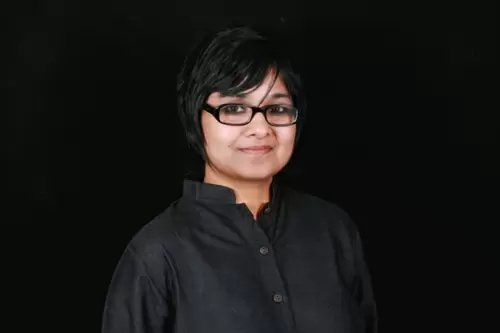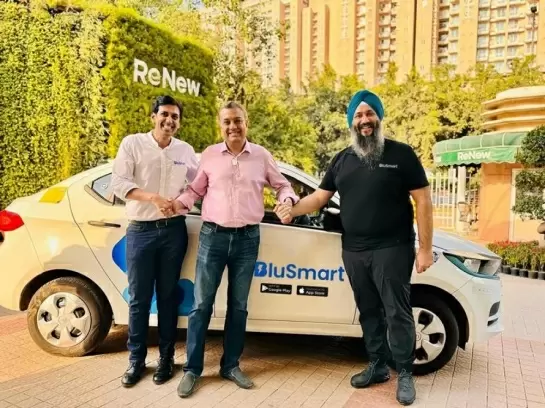‘Proximity goes a long way in building a common mission’
16-May-2016
Vol 7 | Issue 20
Manisha Gupta is not your average entrepreneur. Her StartUp is devoted to helping budding social entrepreneurs get their projects off the ground by lending them development and execution support to seed and scale up ventures that have the potential to create lasting social change, particularly in marginalised sections of society.
Having grown up in an environment where, on the one hand, business ideas were continually discussed and debated and on the other, girls and women were consciously kept away from decision-making in the name of tradition, Gupta decided to tap in on both these experiences to initiate a company that would work towards changing the status quo for women. In this excerpt from Womentrepreneurs: Inspiring Stories of Success, edited by Avinash Kirpal and published by Sage Publications, Gupta recounts the challenges she faced in establishing StartUp.
 |
|
Manisha Gupta is not your average entrepreneur. Her StartUp is devoted to helping budding social entrepreneurs get their projects off the ground (Photo: WFS)
|
Living with a bank account with zero balance: I had little savings to dip into, when I decided to work full-time in StartUp! Prior to this, I had worked in the not-for-profit sector for almost 15 years and had always brought home a salary, which was modest but enough for my needs. The first casualty after my decision to go full-time with StartUp was my personal finance and the esteem that was linked to my being financially independent. More than the loss of regular income, I had to deal with the idea of being financially dependent on my husband. This was very hard because I had been working and earning from the age of 18! Of course my husband was generous, but I was adamant about funding all my personal expenses – such as telephone bills, Internet bills and purchases of books (most important). So I drew on my small kitty of savings, and before I knew it, I had no balance in my bank account.
For more than a year, my personal bank balance hovered between Rs 2,500 and Rs 5,000. I grit my teeth through the period of zero income and reminded myself everyday of my larger mission of change and of the larger long-term non-material accruals that would come from being part of the country’s social entrepreneurship sector. I struggled to stay hopeful everyday. My monetary situation became better after a year, and I started paying myself a salary of Rs15,000. The value of that Rs 15,000 was incomparable. This period trained me to respect money and resources in ways that had a powerful impact.
Now when I look back, I realize that one cannot survive the perils of entrepreneurship unless (a) one is committed to a long-term mission and (b) one is aligned with a mission that is larger than making money.
Dealing with a partnership split: After two years of testing the incubation methodology of StartUp, I brought on board two partners who were designated as cofounders. One was based in Mumbai, and the other was based in Bengaluru. Both were from the corporate sector and had been part of the growth cycle of a large, international consulting firm. They brought a lot of technical and managerial skills to StartUp.
After a satisfactory period of setting the foundation and getting the basics right, as well as building the cofounder chemistry, the partnership split in two years. Both partners exited StartUp! It felt a bit like a tsunami at that time—it was brutal and sudden and came without warning. The partners recommended that we shut down StartUp! But that was unthinkable for me. I had not set myself on the path of entrepreneurship to close down the venture. StartUp was two years old then and had a mind and rhythm of its own. We could not put it to bed. So I decided to move forward and take the responsibility of rebuilding StartUp It took about a year to put matters to a close. This experience taught me a few critical lessons. These were:
• You may bring on board your best friends and closest relatives as business partners. But make sure you hire a lawyer and develop clear contracts with exit clauses for all partners. Make this a priority.
• Get the roles, accountabilities and governance right between all partners. Ensure that partners have clear revenue targets and their financial rewards are linked to the business they bring.
• Ask yourself—am I bringing partners on board because I want passionate entrepreneurs to co-create the journey with me? Or am I bringing on board skilled professionals who I will call cofounders simply because I don’t have money to pay them now? The second option is a recipe for disaster.
• Take time and have multiple discussions with potential partners to identify those who are aligned to your mission. Ensure that in the early stages all partners are working out of the same city and from the same office. It is crucial to have face time. Proximity goes a long way in building a common mission.
Learning that work-life balance is a myth: My daughter Aanya was born in 2004 was five years old when I started building StartUp! I quickly learnt that the concept of work-life balance was never going to play itself out in a neat way in my life. And I was happy and relieved when that realization dawned on me. Once I let go of the expectation from my own self to maintain work-life balance, I became less stressed, less anxious and less edgy. I started to enjoy bringing up my daughter and building up StartUp in a seamless manner. I have found passion in both my roles — as a mother and as an entrepreneur, and therefore, questions of work-life balance don’t bother me because being a mother and an entrepreneur are the core of my life, and life in itself is never balanced.
Like most women entrepreneurs who are responsible for looking after a family in addition to building their entrepreneurial venture, Manisha often felt torn between conflicting calls on her time. She says: ‘I felt it is a duty to promote the wellbeing of my daughter, my husband, my mother and my in-laws. Fortunately for me, my family is supportive and I do not have to bear any strain on that count. My husband is quite content to not get involved in my work. He cheerfully adopted the role of acting as the banker for my financial needs and of providing emotional support if required.’ … Manisha’s work involves frequent travel often to remote places (which she loves!), but when she has to start packing, she does ‘feel pain in leaving Aanya and also a feeling of guilt.’
Manisha’s mother-in-law is a liberal Bengali intellectual. She is an astrophysician and lives in Kolkata. She visits Manisha in Delhi occasionally. Her father-in- law is no more. So Manisha manages to perform her family duties without creating too much stress and without distracting herself from her work.
Still, Manisha has decided not to have a second child. She says: ‘I am a hands-on mom and a full-time entrepreneur. And this means that I have to do the work of two people, and keep time aside for myself. In juggling multiple matters, I have learnt that even as I focus on the sustainability of my business, I must also focus on the sustainability of my person, and continuously build my reserves of energy, resilience and life-force.’
With regard to challenges faced by women on account of gender, Manisha says that she is aware that women find it difficult to raise funds, hire talent and build supply/marketing chains for their start-ups. These challenges arise mainly because of apprehensions that a woman entrepreneur may abandon her venture for family reasons. This poses a serious problem. However, Manisha had become well aware of the nature of these problems during the nine years she had worked at Ashoka and uses that knowledge and experience to sidestep these problems.
(Excerpts from Womentrepreneurs: Inspiring Stories of Success edited by Avinash Kirpal; Published by Sage Publications; Pp: 157; Price: Rs 345.) - Women's Feature Service














